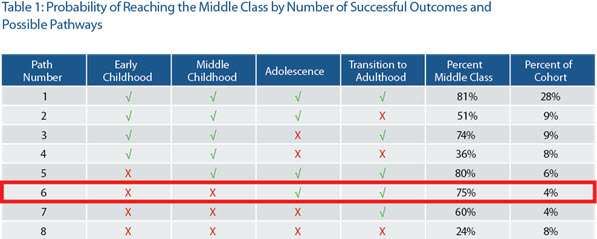Teens vs. Toddlers: When to Intervene?: Second in a four-part series examining the debate over when to intervene to improve social mobility.
Early childhood is important, but there is a danger of determinism here. Toddlers matter, but so do teens. The years of adolescence are full of “make of break” decisions—with potentially lasting impacts on later life—including schoolwork, decisions about college, social pressures towards drugs and other criminal behavior, and first forays in relationships and sex.
What can go wrong in adolescence?
- Unprotected sex. Teen pregnancy is most common among low-income youths, and as Isabel Sawhill puts it, is “a barrier to later upward mobility”. Even after taking background characteristics into account, teen mothers are less likely to finish high school, less likely to ever marry, and more likely to have additional children outside marriage.
- Hanging out with the “wrong crowd”. Research on adolescent risk-taking shows that peer groups in high school often have long lasting effects on the behavior of individuals. Teenagers in social groups in which the majority are aggressive or inclined to deviant behavior will themselves become more aggressive and deviant. Being convicted of a crime or engaging in other risky behavior, such as drug use, can be barriers to later success.
- Dropping out of school. Finishing high school is key to economic mobility. The average income of a high school dropout is significantly lower than that of a high school graduate: : in 2011, the income gap was over $18,000. Moreover, adolescence is when a person makes the decision on whether to go to college, and as we’ve discussed on this blog previously, even an Associate degree improves mobility outcomes.
‘On Track’ Adolescents Likely to Make it to the Middle Class
To reflect the hurdles of adolescence, CCF has developed benchmarks for success (see our 2012 report, Pathways to the Middle Class). The benchmarks inevitably reflect normative judgments—but they are also underpinned by a body of research showing each measure to predict the chances of reaching middle class by middle age. To be successful in adolescence, teens should:
- Graduate from high school with a GPA higher than 2.5,
- Not be convicted of a crime, and
- Not become a teen parent.
A higher proportion of people fail to meet these teen-years benchmarks than for any other life stage. What’s more, our analysis found that individuals who cleared the benchmarks in adolescence, eveanven after struggling in their younger years, were nearly as likely to end up in the middle class as those who’d been successful all along.

Source: Isabel V. Sawhill, Scott Winship, and Kerry Searle Grannis. (2012) Pathways to the Middle Class: Balancing Personal and Public Responsibilities. p. 9.
This suggests that adolescent interventions are crucial: programs that get teenagers back on track by preventing dropouts, teen pregnancy, and deliquency, can improve adult outcomes.
So, teens matter as well as toddlers. Forced to choose, where should we spend our money? That’s the question we’ll address in tomorrow’s blog.
The Brookings Institution is committed to quality, independence, and impact.
We are supported by a diverse array of funders. In line with our values and policies, each Brookings publication represents the sole views of its author(s).




Commentary
Teen Years Important for Mobility
November 5, 2013